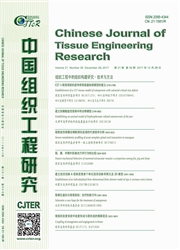

 中文摘要:
中文摘要:
目的:探讨动脉介入新辅助化疗对宫颈癌细胞增殖及凋亡的影响,为中晚期宫颈癌的临床治疗提供依据。方法:选择2012年8月-2015年5月在我院确诊为中晚期宫颈癌并行动脉介入化疗的患者60例作为研究对象。分别在入院时和动脉介入化疗后收集患者肿瘤组织标本,应用免疫组化法检测肿瘤细胞增殖指数(LI),TUNEL法检测肿瘤细胞凋亡指数(AI)。结果:经动脉介入化疗后,宫颈癌细胞的增殖指数显著降低,而凋亡指数显著提高,与化疗前比较,差异具有统计学意义(P〈0.05)。宫颈癌细胞增殖指数LI随临床分期的增加而升高,而凋亡指数AI随临床分期的增加而降低,差异具有统计学意义(P〈0.05);介入化疗后,同一临床分期宫颈癌细胞的增殖指数LI均低于化疗前,而凋亡指数AI则高于化疗前,差异具有统计学意义(P〈0.05)。结论:动脉介入新辅助化疗能够抑制中晚期宫颈癌细胞的增殖,并促进其凋亡,为患者创造手术切除的机会。
 英文摘要:
英文摘要:
Objective: To study the effect of artery interventional neoadjuvant chemotherapy on the proliferation and apoptosis of cervical cancer cells, so as to provide the basis for clinical treatment of locally advanced cervical cancer. Methods: 60 cases who were diagnosed with the advanced cervical cancer and taken the artery interventional chemotherapy in our hospital from August 2012 to May2015 were selected as the research objects. The tumor tissue samples of patients before and after the treatment were collected, and the tumor cell proliferation index(LI) was detected by the immunohistochemical method, and the tumor cell apoptosis index(AI) was detected by the TUNEL method. Results: After interventional chemotherapy, the proliferation of cancer cells decreased, and apoptosis of cancer cells increased when compared with before(P〈0.05). The LI increased with clinical stage increasing, while the AI decreased with the clinical stage increasing(P〈0.05); After interventional chemotherapy, the LI of cervical cancer cells at the same clinical stage was lower than before, and the AI was higher, and the differences were statistically significant(P〈0.05). Conclusion: Arterial neoadjuvant chemotherapy could inhibit the proliferation and promote the apoptosis of advanced cervical cancer cells, and increase the opportunity of operation for patients.
 同期刊论文项目
同期刊论文项目
 同项目期刊论文
同项目期刊论文
 期刊信息
期刊信息
